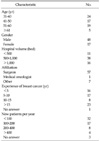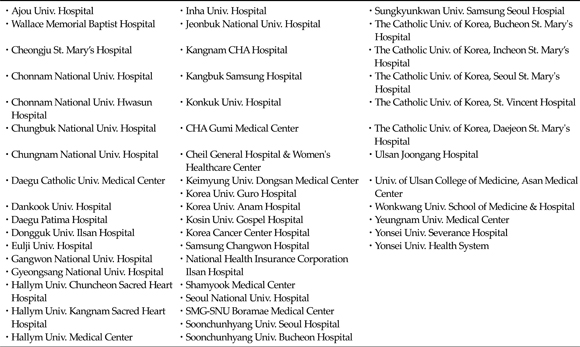Abstract
Purpose
This assesses the current workings of multidisciplinary team (MDT) meetings across Korea through surgeons' reports and their current commitments to MDT meetings pertaining to breast cancer, and to determine any perceived areas of potential improvement.
Methods
A questionnaire was sent out to 307 members of The Korean Breast Cancer Society (KBCS) who worked at comprehensive or university medical centers in Korea. The mailing lists of the KBCS members were obtained with the approval of the society. From December 2008 to February 2009, the survey was distributed by surface and electronic mail, with an initial mailing followed by another distribution to non-responders eight weeks later.
Results
Sixty-five individuals (21.2%) returned the completed survey. Of these, 38 responders (62.3%) participated in MDT meetings. Most (97.4%) breast health specialists regarded MDT meetings as an effective method for treatment planning. Most responders (94.7%) reported that the MDT leader was a breast surgeon.
A breast physician is a medical practitioner with special training in the diagnosis and management of breast disease. This relatively small group of specialized clinicians has a unique and constantly expanding role in multidisciplinary breast teams in Korea. The importance of the team approach is well-known and in the field of breast cancer there is evidence that patients cared for by a multidisciplinary team (MDT) rather than a series of individual practitioners have an improved survival 10 years following diagnosis [1]. National and international clinical practice guidelines [2] endorse multidisciplinary care as the preferred approach to manage breast cancer. However, few studies have looked at how these guidelines are followed by the medical community. Also, the definition of MDT varies both in the literature [3,4] and among health professionals, with no one interpretation being a perfect fit for all situations.
A recent report [3] described that surgery, chemotherapy and hormonal therapy are the most common treatment options for women, thus requiring input from a variety of breast cancer specialists during treatment planning. Care provided by an MDT is thought to offer patients the most appropriate evidence-based care as management plans are based on a broad range of expert knowledge [4]. Improvements in communication and decision-making among health professionals in coordination of care for their patients are other potential benefits. However, the outcomes of the MDT approach have not been rigorously evaluated and evidence from published empirical studies and reports on any benefit is limited [4,5].
This study aimed to assess the current workings of MDT meetings throughout Korea through surgeons' reports and their current commitments to MDT breast meetings, and to determine any perceived areas where there was potential for improvement.
A questionnaire was sent out to 307 members of The Korean Breast Cancer Society (KBCS) who worked at comprehensive or university medical centers in Korea. The mailing lists of the KBCS members were obtained with the approval of the society. From December 2008 to February 2009, the survey was distributed by surface and electronic mail, with an initial mailing followed by another distribution to non-responders eight weeks later. MDT was defined with different specialists working as teams cooperatively with each other and their patients to diagnose, treat and mange breast cancer. The questionnaire was comprised of an introductory cover letter in which the purpose of the survey was indicated; a section soliciting general information from the responder regarding gender, age, hospital volume, affiliation of the department and experience with breast cancer treatment; and the main portion that solicited MDT information including use/non-use of the approach, membership structure, schedule of meetings, contents of meetings and opinions concerning the MDT approach in the treatment of breast cancer.
About 21% (65/307) of KBCS members who were contacted completed and returned the survey. Forty-nine of the 90 institutions (52.1%) that were contacted participated in this survey. Most responders were male (48/65) and worked at hospitals with more than 500 beds (54/65). Fifty-seven of 65 responders (88%) belonged to the Department of Surgery, one to the Department of Medical Oncology, and seven to other departments. Forty-eight responders (75%) had more than 5 years experience in managing breast cancer patients (Table 1).
Most commonly (95%), follow-up involved the Department of Surgery with or without adjuvant chemotherapy. When adjuvant chemotherapy was included, surgeon follow-up occurred in 76% of the cases. Ninety-five percent of patients receiving hormonal therapy were followed up at the Department of Surgery (Table 2).
Thirty-eight of the 61 responders (62.3%) participated in MDT meetings. Of these, 23 responders (37.7%) had not participated in MDT meetings, but felt that the approach was valuable and necessary for improved patient care (Fig. 1A).
Concerning team structure, most MDTs consisted of breast surgeons, medical oncologists, radiologists, pathologists and radiation oncologists. A few teams also included psychiatrists and other support members (Fig. 1B). The largest number of responders (94.7%) reported that the MDT leader was a breast surgeon (Fig. 1C).
A relatively even distribution was evident in the responses concerning the frequency of MDT meetings. Of the 38 MDT meeting participants, 13 attended more than one meeting a week, with the meeting schedule being irregular for seven respondents (Fig. 1D). Almost all newly diagnosed patients, most postoperative patients and recurring cases were discussed in MDT meetings and a small number of patients with benign disease were discussed (Fig. 2A). The discussion of pathology results, radiologic review of disease, surgical findings and appropriate treatment plan were almost always part of a case discussion (Fig. 2B). In comparison, relevant psychosocial issues were discussed in only 2.1% of the meetings.
Clinicians' views regarding the effectiveness of their MDT meetings in optimizing treatment recommendations are summarized in Fig. 2C. Thirty-seven of the 38 respondents regarded the meetings as effective. The respondents opined that MDT meetings allowed for a good contact between disciplines, improved referrals, facilitated collaborative efforts and enabled patients to receive the most current treatment. The robust discussions within meetings were seen as beneficial as they facilitated standardization of treatment and a consensus treatment plan.
Respondents also indicated factors that inhibited effectiveness. These included delayed decision, increased time and manpower, time limitation, confusion, gain and loss among departments and difficulty in managing many patients.
Presently, the vast majority (97.4%) of breast health specialists regarded MDT meetings as an effective method for treatment planning and believed that these meetings result in substantial improvements in care for women with breast cancer. The majority of respondents who do not currently participate in MDT meetings (95.6%) regard them as valuable and necessary.
Large numbers of surgeons, oncologists, pathologists and radiation oncologists regularly attend MDT meetings in Korea. Most often, the meetings are led by a breast surgeon. Although most respondents (95%) described that follow-up involved the Department of Surgery with or without adjuvant chemotherapy, the high level of attendance for medical oncologists was particularly noteworthy given that international audits of MDT functionality consistently reveal that medical oncologists are least likely to attend the meetings, of all medical specialists [6,7]. This is not surprising, however, given that most oncologists in our sample were based in comprehensive or university cancer centers where oncology services are most commonly available.
Presently, the presence of psychologists in MDTs was limited despite clinical practice guidelines [2] highlighting the importance of psychosocial care for cancer patients and the well-documented elevated levels of psychosocial morbidity and unmet emotional and supportive care needs associated with diagnosis and treatment of breast cancer [8,9]. Also, there was a low level of participation by other support personnel such as data managers, coordinators and social workers. Psychosocial issues were not discussed in the majority of responses, yet it is not possible to tell from this data whether links to psychosocial services were in place outside of the meeting.
All newly diagnosed breast cancer patients were discussed in 45% of MDT meetings, a figure less than 60 to 94% noted in studies from the United Kingdom [6,7]. Discussion of benign cases was infrequent (8% of cases).
The schedule, content and composition of MDT meetings varied in the responding institutions. Some meetings were less likely to discuss all patients. Some meetings had a less frequent schedule or were informal, to the point of personal communication between several participants being regarded as an MDT.
The main limitation of our study was that most responders (57/66) were surgeons. So, our results could not show opinions of all MDT members. While it is acknowledged that there may be a bias in reporting of self-attendance by those completing the survey, this study was conducted with an adequate sampling strategy for a relatively large objective. This national study is the first to ascertain the involvement of breast cancer specialists in MDT treatment planning meetings in Korea. It has also provided an insight into MDT meeting structure and format.
Sometimes there is no discussion with a patient prior to the operation. This falls outside current international recommendations. There is a need for more detailed advice with regard to organization and running of MDTs to ensure that all patients with breast cancer can reap the potential benefits of having all aspects of their management discussed at appropriately staffed MDTs.
The MDT approach in breast cancer does have drawbacks that include delayed decision making, allocation of increased time and more manpower, time limitation, confusion, gain and loss among departments and difficulty in managing numerous patients. However, the addition of a breast physician to the team has advantages for all team members and for the patient. A breast physician can enhance the continuity of care and communication between team members. Working in partnership with a breast physician may be of particular benefit to the breast surgeon, allowing the surgeon to focus on newly diagnosed cancer patients and patients with benign disease who require surgery [10].
In conclusion, the majority of health professionals regard MDT meetings as an effective method for treatment planning and a relatively active MDT approach exists in most major centers in Korea. Further work is needed to ensure that MDTs function and co-operate as intended, and that all breast cancer patients have access to an MDT.
Figures and Tables
Fig. 1
(A) Are you participating in multidisciplinary team (MDT) meetings? (B) What members participate in your MDT meeting? (C) Who is the leader of your MDT? (D) How many times per month is your MDT? APN, advanced practice nurse.

References
1. Gillis CR, Hole DJ. Survival outcome of care by specialist surgeons in breast cancer: a study of 3786 patients in the west of Scotland. BMJ. 1996. 312:145–148.
2. Association of Breast Surgery @ BASO, Royal College of Surgeons of England. Guidelines for the management of symptomatic breast disease. Eur J Surg Oncol. 2005. 31:Suppl 1. 1–21.
3. Harrison JD, Choy ET, Spillane A, Butow P, Young JM, Evans A. Australian breast cancer specialists' involvement in multidisciplinary treatment planning meetings. Breast. 2008. 17:335–340.
4. Fleissig A, Jenkins V, Catt S, Fallowfield L. Multidisciplinary teams in cancer care: are they effective in the UK? Lancet Oncol. 2006. 7:935–943.
5. Houssami N, Sainsbury R. Breast cancer: multidisciplinary care and clinical outcomes. Eur J Cancer. 2006. 42:2480–2491.
6. Whelan JM, Griffith CD, Archer T. Breast cancer multi-disciplinary teams in England: much achieved but still more to be done. Breast. 2006. 15:119–122.
7. Macaskill EJ, Thrush S, Walker EM, Dixon JM. Surgeons' views on multi-disciplinary breast meetings. Eur J Cancer. 2006. 42:905–908.
8. Girgis A, Boyes A, Sanson-Fisher RW, Burrows S. Perceived needs of women diagnosed with breast cancer: rural versus urban location. Aust N Z J Public Health. 2000. 24:166–173.
9. Sanson-Fisher R, Girgis A, Boyes A, Bonevski B, Burton L, Cook P. Supportive Care Review Group. The unmet supportive care needs of patients with cancer. Cancer. 2000. 88:226–237.
10. Brennan M, Spillane A. The evolving role of the breast physician in the multidisciplinary breast team. ANZ J Surg. 2007. 77:846–849.




 ePub
ePub Citation
Citation Print
Print






 XML Download
XML Download